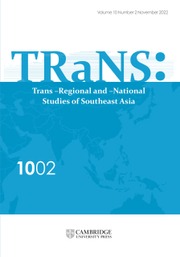Value from Ruin? Governing Speculative Conservation in Ruptured Landscapes
Published online by Cambridge University Press: 05 February 2018
Abstract
This paper examines how state and non-state actors govern through pursuing speculative conservation among resource-dependent people who must renegotiate altered livelihoods amidst extractivism in ruptured landscapes. As donor aid declines and changes form, bilaterals, state agencies, and civil society now pursue advocacy in overlapping spaces of intensifying extractivism and speculative governance in the ruptured frontiers of Southeast Asia. In these spaces, bilaterals and non-governmental organisations (NGOs) struggle to work with upland farmers who negotiate the contrasting expectations of the abstract, speculative nature of conservation initiatives and the lucrative nature of extractive labour in the face of dramatic transformations of agrarian livelihoods and landscapes. Through a case study of the Philippine uplands, we demonstrate that as speculative conservation unfolds and manifests within and beyond these landscapes, it endeavours to revalue nature monetarily in ways that help reorganise labour and capital in an effort to overcome the exhaustion of capital wrought by rupture. We propose that during moments of rupture speculative conservation coproduces value from ruin by renewing and preserving capital flows.
- Type
- Articles
- Information
- TRaNS: Trans-Regional and -National Studies of Southeast Asia , Volume 6 , Issue 1 , January 2018 , pp. 73 - 99
- Copyright
- Copyright © Institute for East Asian Studies, Sogang University 2018
References
- 2
- Cited by




